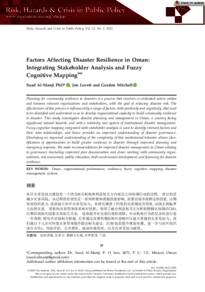Document
Factors affecting disaster resilience in Oman : integrating stakeholder analysis and fuzzy cognitive mapping.
Identifier
DOI: 10.1002/rhc3.12201
Source
Risk, Hazards and Crisis in Public Policy. v. 12, 1, p. 29-50
Contributors
Lovett, Jon., Author
Mitchell, Gordon., Author
Country
United Kingdom.
Publisher
Blackwell Publishing Ltd.
Gregorian
2021-03-01
Language
English
Subject
English abstract
Planning for community resilience to disasters is a process that involves co-ordinated action within and between relevant organizations and stakeholders, with the goal of reducing disaster risk. The effectiveness of this process is influenced by a range of factors, both positively and negatively, that need to be identified and understood so as to develop organizational capacity to build community resilience to disaster. This study investigates disaster planning and management in Oman, a country facing significant natural hazards, and with a relatively new system of institutional disaster management. Fuzzy cognitive mapping integrated with stakeholder analysis is used to identify relevant factors and their inter-relationships, and hence provides an improved understanding of disaster governance. Developing an improved understanding of the complexity of this institutional behavior allows identification of opportunities to build greater resilience to disaster through improved planning and emergency response. We make recommendations for improved disaster management in Oman relating to governance (including improved plan dissemination and closer working with community organizations), risk assessment, public education, built environment development, and financing for disaster resilience.
ISSN
1944-4079
Category
Journal articles

